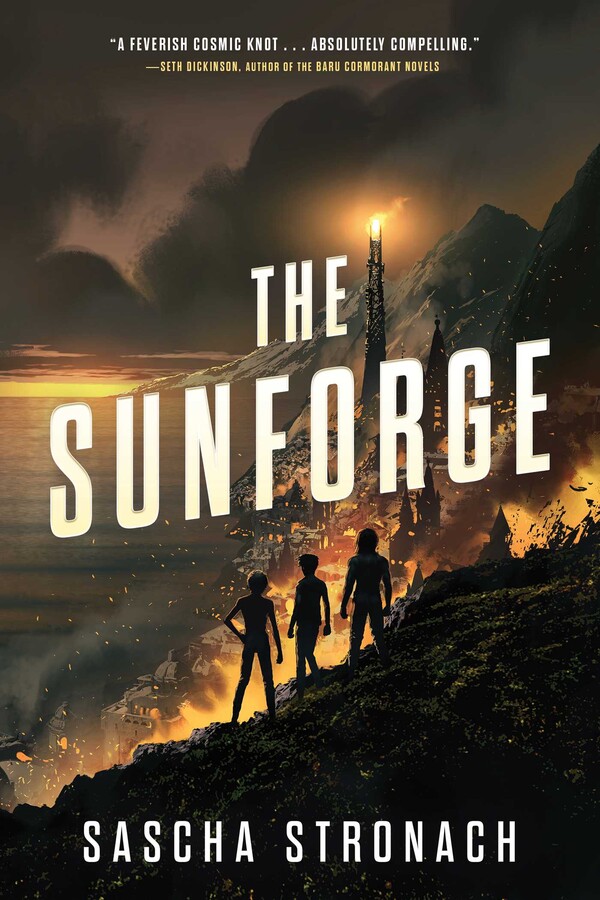Callum sat with his guts in his hands, surrounded by gold bricks, scorched turf and Prussian corpses. They’d been absolute bastards to the man—the remnants of Von Tempsky’s old unit, scalp-takers and cannibals all—but nobody deserved to die in fucking Otago. Callum should’ve died in Scotland, like every man of his blood before him, but he’d cut the fuses half an inch too long. Timing wasn’t exactly an issue when you used the shit for mining: you made the fuses as long as possible, and if they took a long time to blow then you went out for a sandwich break with the lads. Half an inch of fuse, maybe ten seconds’ difference, and his belly was laid open on the turf. Half an inch, because it was cold and his hands were shaking and he barely had enough left to buy food, let alone gloves.
His skin was freezing cold, but his guts were burning hot. It was like all the heat in his body were pulling inwards, t’wards the heart, mounting a brave rearguard to keep the rest of his bits alive. It wasn’t working. He couldn’t feel his legs. He picked up a gold brick, and tapped it against his tooth. It went clink, like it should. The last shipment out of Otago before the mines closed, now spread out all across the highlands, mixed in with little bits of blast-grilled German savage; mercenaries, not paid nearly enough to find themselves spread out to the winds. They took scalps because they’d heard native folks did it. Wrong continent for that business entirely, but nobody felt the need to correct them.
Four hundred-thousand pounds worth of gold, destined for London, for the fingers and necks of lordly ladies. More money in one brick than Callum had seen in his lifetime. He spat, and it painted the turf red. The pain hollowed him out like rot inside a tooth. He panted and tried to stay conscious, but night was coming and there weren’t shit he could do about it. His da had come from the other highlands—the real highlands—after the clearances drove the family north, to Inverness. Otago wasn’t home, but it was close enough; the place was emptier than Am Fuckin Monadh Ruadh.
Like the highlands back home, there was nothing left. Not a nugget of gold: not above-ground, not in the rivers, not anywhere you could reach with a practicable quantity of dynamite. Boys like Callum had flooded south with gold in their eyes, and come out with dust in their bellies. Thousands of them, tens of thousands, all for it to dry up in less than ten years. Up north they were so pressed for land they were killing brown men for it, but Otago had empty town after empty town stretched out across the hills like so many winter flowers. There was plenty of space—maybe they just liked killing brown men. Some of the gold would stay in-country: make its way to Wellington, fund more bullets to fight more Māori. There weren’t enough land, apparently. He’d heard that one back home, when they started dragging families out of the highlands, pushing them to Inverness and Aberdeen and Glasgow—they needed more space. Now there was nothing but space and silence. Silence in the Waikato, silence in Am Monadh Ruadh, silence across the Otago highlands—boundless, monstrous silence filled only by the dull clinking of gold.
Callum had nothing left to do but die, but instead he sang. It sent a shudder through him, from his balls to his tailbone and then off up his spine, but he sang. He didn’t know many songs that fit right: it was mostly miners’ and sailors’ stuff about girlies back home and how very well they filled out their clothes. There was one though, that da had sung sometimes. Burns? Probably Burns. It was always fuckin’ Burns. His tenor came out through blood and foaming spit, liquid and sloppy, tinged purple by the ache in his guts.
Farewell to the mountains, high-cover’d with snow,
Farewell to the straths and green vallies below;
The Company would find the gold. They had a system in place for this sort of thing. Half the plan was about keeping the damned cart in one piece so he could ride it away. Rocks fall in front of Germans, Germans come to a stop, threaten Germans with further demolition unless they leave the gold and fuck off back to Dunedin. Best laid plans and all that. Callum didn’t know robbery: he knew mining. For a moment it had seemed like one could become the other but that moment had all gone up in cordite smoke. In the burning glare of hindsight, he knew it had never been a clever plan, but hell—when all you’ve got in dynamite, everybody looks like a goldmine.
It hadn’t blown when it was meant to of course, so he’d run—worthless fireheaded tin-cocked fool—to check on it. Saw the Germans actually moving through the pass un-stopped, run to check on the sticks, rounded the corner just in time to see the whole damn highlands come to pieces. The blast had taken out at least one of his eardrums, and sent a bullet-sized piece of rock into his stomach and out the other side. Shucked his belly like an old woman working wi’ peas, spilt him out over the stone. He was a dead man and he knew it—the message just hadn’t reached his heart yet.
With nothing better to do, in defiance of God and Country and the gold rush and the clearances and the bastard cannibal Germans and the Company, Callum sang while the light faded.
Farewell to the forests and wild-hanging woods,
Farewell to the torrents and loud-pouring floods.
My heart’s in the highlands, my heart is not—
